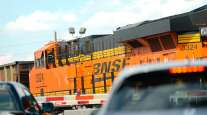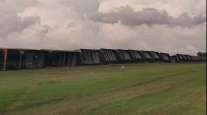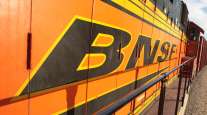Burlington Northern Santa Fe Profits Drop 8.4%

Burlington Northern Santa Fe, the parent company of BNSF Railway, reported net income fell 8.4% in the fourth quarter but, similar to other Class I railroads, the decline in the final three months was significantly less than earlier in 2016.
The railroad freight carrier, a division of Berkshire Hathaway Inc., generated $993 million in profits versus $1.1 billion during the same period in 2015. However, the dropoff was less severe than the 16% decline in full-year profits to $3.6 billion.
Revenue dropped 1.6% companywide in the fourth quarter to $5.3 billion compared with the same period in 2015, but it was better than the sequential declines of 15% in each of the first two quarters and 8% in the third quarter.
For the full year, revenue fell 9.7% to $19.8 billion, the second straight annual decline. BNSF was able to partially offset the drop in revenue by lowering expenses on salary and benefits, fuel, equipment rentals and other materials. However, it couldn’t overcome the decline completely due to a $2.1 billion depreciation charge.
“But were we to spend that sum and no more annually, our railroad would soon deteriorate and become less competitive,” Buffett pointed out. “The reality is that — simply to hold our own — we need to spend far more than the cost we show for depreciation. Moreover, a wide disparity will prevail for decades.”
As a result, operating income, or the amount left over after expenses were deducted from revenues, dropped to $1.8 billion from $2 billion in the 2015 fourth quarter. For the full year, it was $6.7 billion compared with $7.7 billion in 2015.
Billionaire investor Warren Buffett wrote in his Feb. 25 letter to investors that it’s difficult to make a comparison with BNSF and competitors CSX Corp., Kansas City Southern Railway Co., Norfolk Southern Corp. and Union Pacific Railroad because of “significant differences in both their mix of cargo and the average distance the load is carried.”
“To supply a very crude measure, however, our revenue per ton-mile was 3 cents last year, while shipping costs for customers of the other four major U.S.-based railroads ranged from 4 cents to 5 cents,” Buffett wrote.
Intermodal performed better in the fourth quarter than during the prior six months, similar to other publicly traded railroads. Intermodal revenue grew 3% to $1.7 billion versus the same period in 2015, reversing declines of 3% in the third quarter and 5% in the second quarter. Volume increased 3.5% to 1.3 million carloads in the fourth quarter year-over-year, versus 4% and 3% declines in the previous two quarters, respectively. Intermodal accounted for about 35% of BNSF’s total revenue.
Industrial business, about 25% of total revenue, fell 8.8% to $1.2 billion in the quarter. BNSF transports petroleum, chemicals, plastics, food, beverages, and construction and items in the industrial business. Revenue from coal dropped 6.4% to $996 million.
Agriculture revenue, about 22% of the total, rose 5.4% to $1.2 billion in the fourth quarter. BNSF transports farm items such as corn, wheat, soybeans, barley, oats, rye and flour.
Independent rail analyst Anthony Hatch told Transport Topics that the results were consistent with the freight recession in 2016 and a weak environment for coal and crude oil shipments. But similar to other railroads, he said the fourth quarter could be a turnaround for intermodal.
“Compared with their main rival, Union Pacific, BNSF outperformed in intermodal in the final quarter [volumes and revenues both up 3% compared to flattish], performed similarly in coal, and strangely underperformed [versus Union Pacific] in agriculture [revenues up 5% vs. +7%], one of BNSF’s usual strengths,” Hatch said.
The operating ratio in the fourth quarter deteriorated 250 basis points to 65.1%. For the full year, it went down 150 basis points to 65.5%, although Hatch pointed out that the ratio is good for a railroad company.
Nevertheless, Buffett told investors that his company continued to invest in the BNSF and Berkshire Hathaway Energy Co. equipment because capital expenditures will pay off in the long run.
“Our confidence is justified both by our past experience and by the knowledge that society will forever need huge investments in both transportation and energy," Buffett wrote. "It is in the self-interest of governments to treat capital providers in a manner that will ensure the continued flow of funds to essential projects.”




